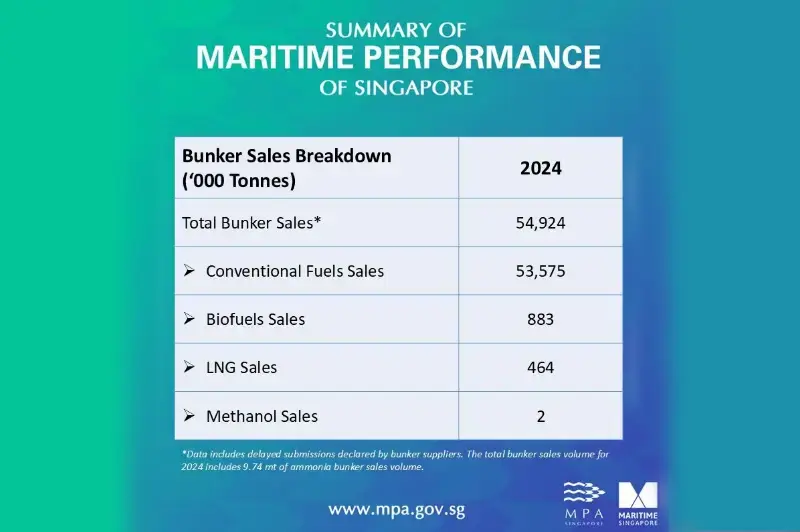Singapore, a global leader in maritime and bunkering services, has once again proven its prominence in the international shipping industry with a significant increase in bunker sales in 2024. The Maritime and Port Authority of Singapore (MPA Singapore) reported total bunker sales of 54.92 million tonnes, a 5.98% increase from 2023’s 51.82 million tonnes. This growth highlights Singapore’s continued focus on efficiency, innovation, and its drive to support the global energy transition.
Table of Contents
Year-to-Year Sales Growth: A Strong Performance
In 2024, Singapore saw notable growth across various fuel types, with conventional fuels continuing to play a key role in bunkering operations. The total sales for conventional fuels reached 53.58 million tonnes, marking a 4.66% increase from 2023’s 51.19 million tonnes. This steady rise reflects the sustained demand for traditional fuels, which remain vital to global shipping activities.
Conventional Fuels Sales:
- 2023: 51.19 million tonnes
- 2024: 53.58 million tonnes (up 4.66%)
Surge in Alternative Fuels Adoption
In line with the shipping industry’s push toward decarbonization, Singapore has experienced impressive growth in the adoption of alternative fuels. The year 2024 saw substantial increases in the sales of biofuels, LNG, and the introduction of methanol, underscoring the shift towards more sustainable fuel options.
- Biofuels: Biofuel bunkering sales rose dramatically by 68.51%, increasing from 524,000 tonnes in 2023 to 883,000 tonnes in 2024. This surge reflects the growing demand for cleaner-burning fuels and a commitment to reducing emissions.
- LNG (Liquefied Natural Gas): LNG Bunkering sales saw an exceptional 318.92% increase, rising from 111,000 tonnes in 2023 to 464,000 tonnes in 2024. This growth highlights LNG’s role as an important transitional fuel in reducing shipping emissions.
- Methanol: methanol bunkering sales was 2,000 tonnes in 2024. following its debut in the market in 2023. The introduction of methanol as a marine fuel highlights Singapore’s commitment to diversifying its fuel offerings and supporting green shipping initiatives.
- Ammonia: For the first time in 2024, Singapore has successfully supplied 9.74 tonnes of ammonia for bunkering. The successful supply of ammonia underscores Singapore’s growing role as a leader in the adoption of alternative fuels, supporting the decarbonization efforts within the shipping sector. With ammonia as marine fuel seen as a promising solution for reducing carbon emissions, this development paves the way for more widespread adoption in the years to come.
Singapore’s Alternative Fuels Sales in 2024 surpass 1.3 million tonnes
- Biofuels: 2023 – 524,000 tonnes and 2024 – 883,000 tonnes (+68.51%)
- LNG: 2023 – 111,000 tonnes and 2024 – 464,000 tonnes (+318.92%)
- Methanol: (Debut last year in 2023) – 2024 – 2,000 tonnes
- Ammonia: (Debut this year in 2024) 9.74 tonnes
Supporting the Energy Transition
Singapore’s impressive growth in alternative fuel sales underscores its proactive efforts to support the maritime energy transition. With the introduction of methanol and the rapid rise in biofuels and LNG, Singapore is playing a crucial role in helping the global shipping industry meet the International Maritime Organization’s (IMO) decarbonization targets.
The Port of Singapore continues to invest in infrastructure, research, and strategic partnerships to accommodate the rising demand for cleaner fuels. These efforts are integral to ensuring that Singapore remains a global leader in sustainable bunkering solutions.
Singapore Port – A Maritime Hub Positioned for the Future
As the maritime industry looks toward a sustainable future, Singapore’s role as a maritime hub remains pivotal. With record-breaking bunker sales and a growing portfolio of alternative fuels, Singapore is not only meeting the needs of the shipping industry today but also setting the stage for a greener, more sustainable maritime future.
This continued success solidifies Singapore’s position as a leading global maritime and bunkering hub, championing innovation, sustainability, and the decarbonization of one of the world’s most important industries.
Source MPA Singapore

